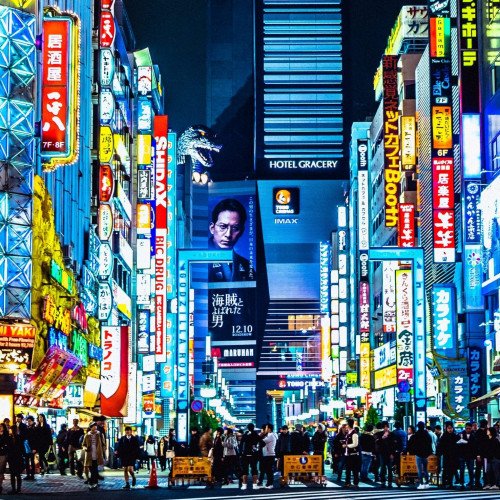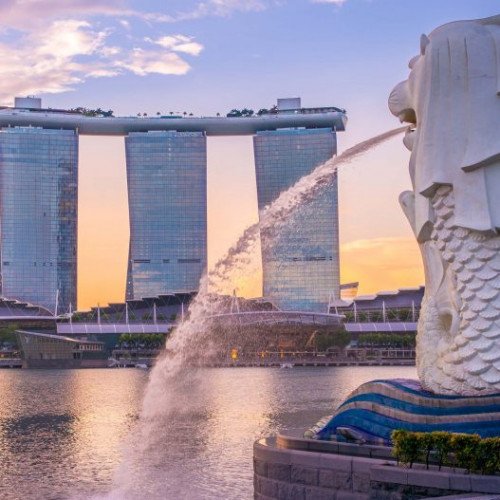Which Asia country is the most developed: Japan vs Singapore

Japan
Japan (Japanese: 日本, Nippon [ɲippoꜜɴ] (listen) or Nihon [ɲihoꜜɴ] (listen)) is an island country in East Asia, located in the northwest Pacific Ocean. It is bordered on the west by the Sea of Japan, and extends from the Sea of Okhotsk in the north toward the East China Sea and Taiwan in the south. Part of the Ring of Fire, Japan spans an archipelago of 6852 islands covering 377,975 square kilometers (145,937 sq mi); the five main islands are Hokkaido, Honshu, Shikoku, Kyushu, and Okinawa. Tokyo is Japan's capital and largest city; other major cities include Yokohama, Osaka, Nagoya, Sapporo, Fukuoka, Kobe, and Kyoto. Japan is the eleventh-most populous country in the world, as well as one of the most densely populated and urbanized. About three-fourths of the country's terrain is mountainous, concentrating its population of 125.62 million on narrow coastal plains. Japan is divided into 47 administrative prefectures and eight traditional regions. The Greater Tokyo Area is the most populous metropolitan area in the world, with more than 37.4 million residents. Japan has been inhabited since the Upper Paleolithic period (30,000 BC), though the first mentions of the archipelago appear in Chinese chronicles from the 1st century AD. Between the 4th and 9th centuries, the kingdoms of Japan became unified under an emperor and his imperial court based in Heian-kyō. Beginning in the 12th century, political power was held by a series of military dictators (shōgun) and feudal lords (daimyō), and enforced by a class of warrior nobility (samurai). After a century-long period of civil war, the country was reunified in 1603 under the Tokugawa shogunate, which enacted an isolationist foreign policy. In 1854, a United States fleet forced Japan to open trade to the West, which led to the end of the shogunate and the restoration of imperial power in 1868. In the Meiji period, the Empire of Japan adopted a Western-styled constitution and pursued a program of industrialization and modernization. In 1937, Japan invaded China; in 1941, it entered World War II as an Axis power. After suffering defeat in the Pacific War and two atomic bombings, Japan surrendered in 1945 and came under a seven-year Allied occupation, during which it adopted a new constitution. Since 1947, Japan has maintained a unitary parliamentary constitutional monarchy with a bicameral legislature, the National Diet. Japan is a great power and a member of numerous international organizations, including the United Nations (since 1956), the OECD, and the Group of Seven. Although it has renounced its right to declare war, the country maintains Self-Defense Forces that are ranked as the world's fourth-most powerful military. After World War II, Japan experienced high economic growth, becoming the second-largest economy in the world by 1990 before being surpassed by China in 2010. Despite stagnant growth since the Lost Decade, the country's economy remains the third-largest by nominal GDP and the fourth-largest by PPP. A leader in the automotive and electronics industries, Japan has made significant contributions to science and technology. Ranked the second-highest country on the Human Development Index in Asia after Singapore, Japan has the world's second-highest life expectancy, though it is experiencing a decline in population. The culture of Japan is well known around the world, including its art, cuisine, music, and popular culture, which encompasses prominent animation and video game industries.
Statistics for this Xoptio

Singapore
Singapore ( (listen)), officially the Republic of Singapore, is a sovereign island city-state in maritime Southeast Asia. It lies about one degree of latitude (137 kilometres or 85 miles) north of the equator, off the southern tip of the Malay Peninsula, bordering the Straits of Malacca to the west, the Riau Islands (Indonesia) to the south, and the South China Sea to the east. The country's territory is composed of one main island, 63 satellite islands and islets, and one outlying islet, the combined area of which has increased by 25% since the country's independence as a result of extensive land reclamation projects. It has the second greatest population density in the world. The country has almost 5.7 million residents, 61% (3.4 million) of whom are Singaporean citizens. There are four official languages of Singapore: English, Malay, Chinese and Tamil. English is the lingua franca. Multiracialism is enshrined in the constitution, and continues to shape national policies in education, housing, and politics. Although its history stretches back millennia, modern Singapore was founded in 1819 by Sir Stamford Raffles as a trading post of the British Empire. In 1867, the colonies in East Asia were reorganised and Singapore came under the direct control of Britain as part of the Straits Settlements. During the Second World War, Singapore was occupied by Japan in 1942, but returned to British control as a separate crown colony following Japan's surrender in 1945. Singapore gained self-governance in 1959, and in 1963 became part of the new federation of Malaysia, alongside Malaya, North Borneo, and Sarawak. Ideological differences led to Singapore being expelled from the federation two years later, becoming an independent country. After early years of turbulence and despite lacking natural resources and a hinterland, the nation rapidly developed to become one of the Four Asian Tigers based on external trade, becoming a highly developed country; it is ranked ninth on the UN Human Development Index, and has the second-highest GDP per capita (PPP) in the world. Singapore is the only country in Asia with an AAA sovereign rating from all major rating agencies. It is a major financial and shipping hub, consistently ranked the most expensive city to live in since 2013, and has been identified as a tax haven. Singapore is placed highly in key social indicators: education, healthcare, quality of life, personal safety and housing, with a home-ownership rate of 91%. Singaporeans enjoy one of the world's longest life expectancies, fastest Internet connection speeds and one of the lowest infant mortality rates in the world. Singapore is a unitary parliamentary republic with a Westminster system of unicameral parliamentary government. While elections are considered generally free, the government exercises significant control over politics and society, and the People's Action Party has ruled continuously since independence. One of the five founding members of ASEAN, Singapore is also the headquarters of the Asia-Pacific Economic Cooperation (APEC) Secretariat and Pacific Economic Cooperation Council (PECC) Secretariat, as well as many international conferences and events. Singapore is also a member of the United Nations, World Trade Organization, East Asia Summit, Non-Aligned Movement and the Commonwealth of Nations.